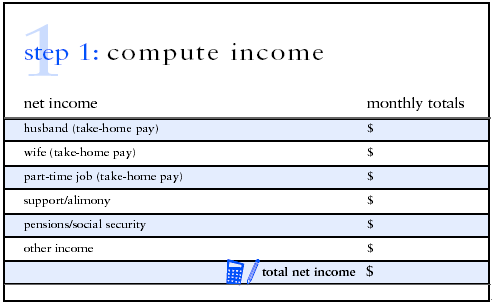 |
|
| Credit Counseling Service |
|
|
|
 |
|
|
|
 |
|
| Navigation: HOME >> Credit Counseling Service >>Online Education>>Budgeting Basics |
|
|
|
 Budgeting & Credit Counseling Services Budgeting & Credit Counseling Services
Budgeting is the blueprint for a family's financial future. Budgeting basics is not about how much money you have, but how you handle the money you do have.
Our budgeting and credit counseling services help you handle your money more effectively, with a good spending plan.
When should you start a spending plan? How about now? A spending plan helps you to:
- manage your income and control spending.
- prepare for those large, periodic expenses - the ones that come quarterly or every six months.
- set aside funds for emergencies.
- put your money to better use, doing more with less.
|
 |
 Creating a Spending Plan Creating a Spending Plan
Budgeting your finances can be a challenge, but it becomes easier as you go along. Here are some key rules that will help you successfully budget your money.
- Set financial goals that are realistic and specific. This will help keep your spending in line or motivate you to save.
- Pay attention to how you spend your money. Get in the habit of tracking your day-to-day expenses to see where all of your money 'disappears' to.
Give top priority to your financial needs, and then consider your wants. Prioritize your family's expenses according to needs.
- Set aside a fixed amount for savings every payday - ideally 5-10% of your net income. If 5-10% is too much, start with $10 a week and gradually increase the amount as you get in the habit of setting aside money in a savings account.
- Limit debt payments to 15-20% of your net income. Are you over your head in debt?
Create a Spending Plan Step-by-Step
Step 1 - Compute your income
Step 2 - Add up monthly expenses
Follow these guidelines:
List all fixed expenses, such as mortgage and loan payments.
List all variable expenses, such as food, utilities, and gas.
Don't forget periodic expenses - expenses that occur irregularly - such as car insurance, taxes, etc.
If necessary, research expenses by using:
o Checkbook registers
o Credit card statements
o Phone and utility bills
o Expense tracking and the Advantage Money Monitor
Enter all information on the Budget Analysis Sheet.
As a family, set spending limits for individual spending categories. This will help you and your family prevent impulse purchases and to live within your budget.
Step 3 - Track expenses
Get in the habit of tracking your spending - the small everyday costs and the larger periodic expenses that don't occur every month. Your goal is to come up with a monthly figure to list in all applicable categories on the Budget Analysis Sheet.
Daily Expenses
Periodic Expenses
Periodic expenses are those bills that aren't due every month. Because they tend to be large bills, you need to set aside a certain amount every month. This way, the money will be there when you need it.
How to Save for a Periodic Expense:
1. Calculate the annual cost.
2. Divide by 12 months.
3. Save that amount every month in a designated savings or checking account
Examples of Periodic Expenses
auto repairs/maintenance
insurance not billed monthly (homeowners', life, auto, other)
wage tax not deducted from pay
clothing
medical, dental, vision exams
real estate taxes not escrowed
water and sewage
tuition
Step 4 - Analyze spending vs. income
Compare the total outlay of your expenses with your total income from your Budget Analysis Sheet.
If your expenses equal or are less than your income, you're doing great. Continue to monitor your spending from time to time, and adjust to suit your financial needs.
If you expenses exceed your income, you'll need to take action.
Pick the strategy that best suits your situation:
Increase your income.
o Work overtime or a second job, if possible.
o Ask a family member to work part-time, if possible.
o Make sure that your federal withholding is correct. Decrease your expenses.
o Cut back, not completely out. Do a combination of both.
|
 |
 Financial Goals Chart Financial Goals Chart
The idea of goal setting is to decide specifically what you want. Goals should be set and reconsidered periodically because they can change. Goals can be short-term or long-term. Every family member should have a part in deciding which goals are selected. You may have to negotiate with each other.
Once you've determined your goals, estimate their cost and decide when you want to accomplish them. Divide the cost by the number of months it will take to accomplish the goal to know how much to save each month. 
|
 |
 Tracking Expenses Chart Tracking Expenses Chart
Tracking your daily expenses helps you to find out where your money goes and to identify areas where you can reduce spending. Keeping track of your daily expenses can quickly become an easy routine. Here are some tips:
Keep a small notebook with you to record all purchases.
Ask for receipts for every purchase.
Record every expense, no matter how small.
Once a week, enter your daily spending on to the Advantage Credit Counseling Money Monitor. ?Use that information to compute monthly totals to list on the Budget Analysis.
|
 |
 Compute Your Income Chart Compute Your Income Chart
Follow these guidelines to accurately compute your income on the form.
Count all of your regular income from all sources; your take-home pay (after taxes), your spouse's pay, part-time job, support, alimony, pensions, social security, etc.
Do not include overtime, bonuses or other irregular payments.
Count only the income from four-week months. If you are paid weekly or biweekly, you will receive extra paychecks during some months because of the way the calendar falls. Deposit these extra paychecks into savings. Don't base your budget on them.
If you are self-employed, take an average of the last three years of your net profits and use it as your income.
Add up all your income and enter this amount on the Total Income line in the lower right corner of the Budget Analysis Sheet. 
|
 |
 Savings Strategies Savings Strategies
How can you make savings a consistent part of your budget? Here are some suggestions to consider:
Set financial goals - both short-term and long-term. They really help you stick to your budget and will motivate you to save.
Use payroll withholding or direct deposit, if your employer offers it. Determine a set amount of money you will have deducted from your paycheck. This way, you don't even 'see' the money; it automatically goes into your savings account.
Save any additional income, such as raises, overtime, bonuses, or extra paychecks (due to the calendar).
Save your tax refund.
After you pay off an installment loan, continue to pay the monthly amount to your own savings account.
Save your loose change! It's a surprisingly easy way to save. |
 |
 Budgeting Basics Summary Budgeting Basics Summary
Using the information described in this section will help you take control of your finances. You'll be able to meet goals, handle emergencies and pay those large periodic expenses when due.
With an unlimited supply of goods and services to choose from, but only a limited amount of financial resources, budgeting will help you make the right choices on when to spend and when not to.
Keep your spending plan handy as your blueprint for financial success. And contact the professionals at Simple Credit Counseling Service if you need help with your financial difficulties. |
 |
 Cost Cutting Tips Cost Cutting Tips
Utilities
, Ask your utility company to perform an energy audit of your home.
, Set the water heater to the lowest acceptable temperature.
, Eliminate premium cable and extra phone services.
, In the winter, turn down the thermostat during the day when you're not home.
, Consider buying a programmable thermostat.
, Get rid of halogen lamps. They use 4 times more energy than lamps with 75-watt bulbs.
Grocery items
, Avoid costly convenience stores and convenience food items.
, Use coupons if they will result in products that are cheaper than store brands.
, Keep simple foods on hand when you're too tired to cook to avoid eating out.
, Buy store-brand over-the-counter medication and pain relievers. Compare the ingredients; they usually will be the same.
, Pack your own lunch. A restaurant lunch can cost four times more than the one you bring from home
Entertainment
, Make use of free entertainment at public libraries and local parks.
, Form a dinner club with friends and take turns hosting dinners.
, Wait until movies arrive at cheaper neighborhood theaters or rent videos.
, Go to matinees
Insurance
, Discuss increasing your car insurance deductible with your agent.
, Discuss eliminating collision coverage on older cars.
, Shop around for insurance.
, Discuss increasing your homeowner's insurance deductibles with your agent.
, Consider term vs. whole life insurance
Gift giving
, Cut back on expensive gifts. Shop year round at sales to stock up birthday gifts on holiday.
, Avoid expensive gift wrap. Buy holiday gift wrap at post-holiday sales. Re-use gift bags.
, Give gift certificates as gifts. This way, you won't overspend.
, Consider a grab bag if you're part of a large family.
, Give 'coupons' for gifts. Make them good for car washes, house cleaning, baking, dinners, etc
|
|
|
|
|
 |
|
|
| |